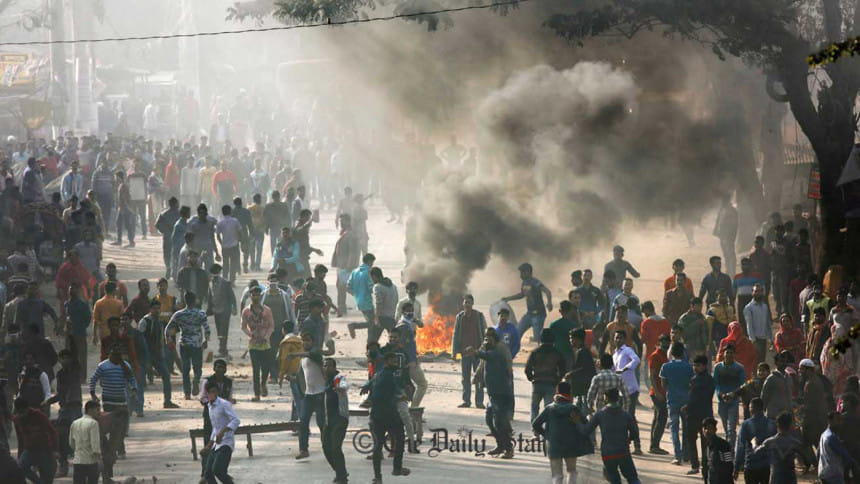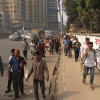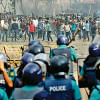RMG unrest: 10 hurt in ‘cop action’ in Ashulia

-- Cops disperse protesters from the Dhaka-Tangail highway
-- 51 RMG factories shut in Ashulia today
At least 10 people were injured when police charged batons and used water cannons to disperse the readymade garment workers, who blocked the Dhaka-Tangail highway in Ashulia this morning protesting disparity in their new wage structure.
A few more people also suffered minor injuries as the protesting workers threw brick chips targeting the law enforcers, our Savar correspondent reports quoting witnesses.
Hundreds of garment workers took to the streets in Jamgora area of Ashulia, on the outskirts of Dhaka, for the seventh day around 8:00am and blocked the Dhaka-Tangail highway, halting traffic movement.
Police dispersed them by charging batons and using water cannon around 9:30am.

The workers were seen taking position at different points of Ashulia after police dispelled them.
Sana Shaminur Rahman, superintendent of Dhaka Industrial Police-1, told our correspondent that the traffic movement started on the highway following police intervention.
“We dispersed the workers by firing tear shell and using water cannon as they blocked at least 10 points of the highway and its adjacent roads, and to avoid any untoward situation,” he said.
Some 51 garment factories of Ashulia areas remained closed today following the workers unrest, the SP added.
Besides, the workers of several garment factories, including Standard Group, in Savar are staging demonstration since the morning, not joining their work, our correspondent reports quoting factory workers.
Meanwhile, the government is expected to announce today a revised wage structure for apparel workers of grades 3, 4 and 5, in efforts to quell the labour unrest that has affected production in the country's largest forex-earning sector.
At an emergency meeting yesterday, the 20-member crisis management committee formed to resolve the matter agreed in principle to increase the basic pay in those grades.
Bangladesh Garment Manufacturers and Exporters Association also called an emergency press conference at its Dhaka office today to brief media on the production loss, the challenges in shipment, number of factories that are closed and other issues.
WHAT ARE THE WORKERS DEMANDING?
The workers have alleged that the monthly wage in the seventh grade increased to Tk 8,000 from Tk 5,300 as per the latest gazette published by the government last year. But, the salary of the workers in other grades did not increase at the same rate.
The salary hike for the entry-level workers was more than that of their senior operators, who have been working for more than seven to eight years. The new wage has been effective from December 1. Major disparity in the salary hike was noticed in the third and fourth grades as their salaries were not raised like that of entry-level workers.
In most of the grades, other than the seventh, only Tk 500 was raised in the new salary structure, whereas an entry-level worker's salary had increased by Tk 2,700 at one go.
WHAT DID THE TRIPARTITE BODY SAY ABOUT THE WAGE STRUCTURE?
The tripartite committee formed to resolve the labour unrest in garment industry has found disparity in three grades of the workers' pay structure, and has started working to minimise the wage gap that sparked the protests five days ago.
The 10-member committee with representatives from the government, union leaders and factory owners said disparity was found in grades three, four and five.

 For all latest news, follow The Daily Star's Google News channel.
For all latest news, follow The Daily Star's Google News channel. 








Comments